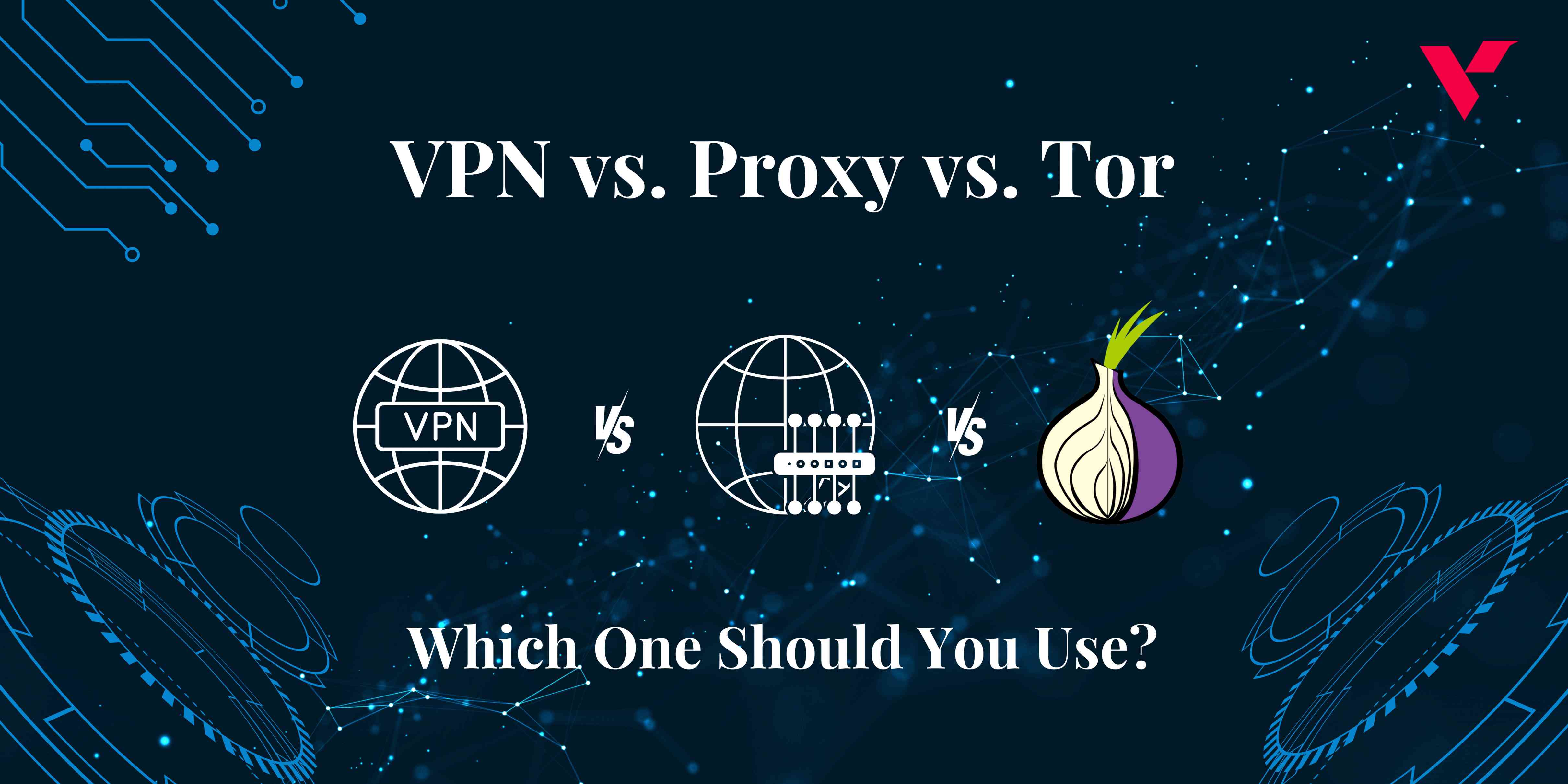Popular Tools by VOCSO
What was the last thing you bought online? Nowadays almost everything that is used in our routine life is available online. You just have to search for the best alternative, place the order, pay, and wait for the item to be delivered to your doorstep.
eCommerce businesses have seen tremendous growth, especially during the covid-19 situation. People order food, groceries, medicines, electronics, and whatnot from famous eCommerce platforms. Around 26 million eCommerce websites are running worldwide. According to Statista, eCommerce sales might reach 7.5 trillion dollars by the year 2025.
If you own an online store, you have a chance to earn a hefty amount in the upcoming years. So, I have gathered some top eCommerce analytics tools for improving the conversion rate of your eCommerce store. Let’s discuss each analytics tool in detail.
Table of Contents
eCommerce Analytics- What it is and what’s it used for?
eCommerce Analytics is a process of collecting data for the online store that you own. It helps you increase online sales by making data-driven decisions depending on the user’s interactivity. By using this user data, online businesses can easily understand any changes in end-users behavior related to market products and prices.
Analytical tools for online stores provide information for almost all parts of a customer’s journey on that eCommerce website. Owners can discover data like customer experience, cart abandonment, user interactions, etc.
What’s the use of eCommerce Analytics tools?
There are various ways that one can use these analytics tools and data gathered by them to grow their business. Here we will discuss some of them:
1. Boosts the conversion rate of your online store
Any eCommerce analytics tool helps the owner of the online store to analyze, track and measure the website’s performance & customer behavior. Here are the ways by which these tools increase the conversion rate of the eCommerce website:
- Personalized customer experiences: by keeping an eye on the customer behavior data, the analytics tool helps you personalize and customize the user experience.
- Understand customer behavior patterns: Any eCommerce tool can help the owner understand the customer’s interaction with their website.
- Enhance product listings: eCommerce tools can give insights into which products are popular amongst the users and which products are mostly abandoned from the carts.
- Work on website performance: You can easily monitor your eCommerce website performance using different analytics tools.
2. Enhance user experience
The data of analytics tools can give you information on how to develop an improved user experience (UX) for your eCommerce website.
For instance, your eCommerce website can display the product recommendation section according to the user data that different tools have collected. It makes shopping easy and more feasible for users and they can get their required products easily from the website.
As the world increasingly moves online, it’s more important than ever for businesses to track their performance in the digital space. That’s where e-commerce analytics software comes in! But what is e-commerce analytics software, you ask? It’s a powerful tool that helps companies identify their most- and least-performant products, monitor buyer and consumer behavior, and determine which issues impact the business. All these keep you up to date with ongoing eCommerce trends.
There are many benefits of using eCommerce analytics tools. Now we will discuss the most popular ones that eCommerce Development Companies use. Let’s begin!
Top eCommerce analytics tools to use in the upcoming time
1. Kissmetrics
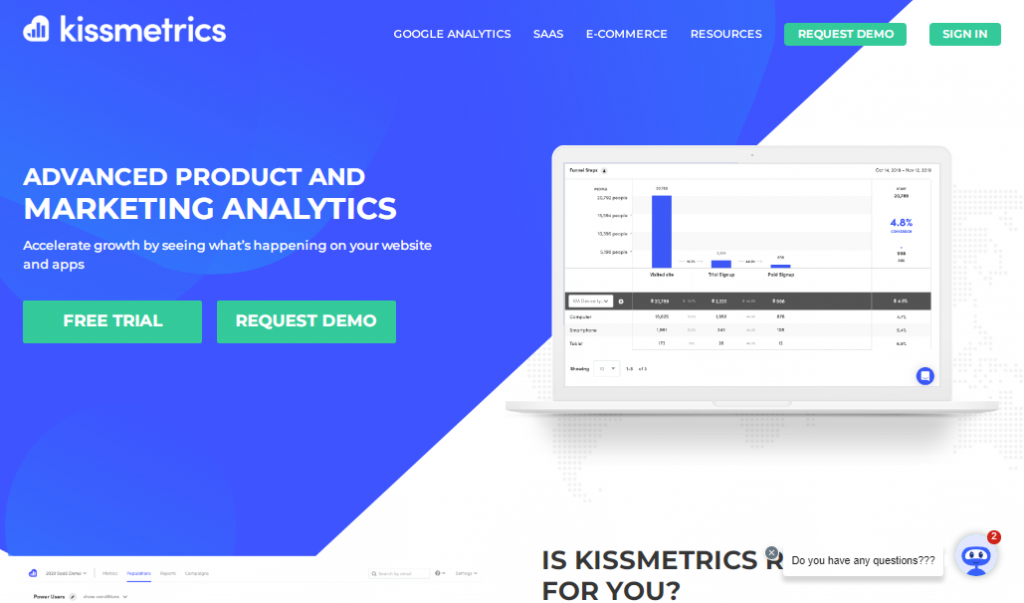
Kissmetrics is one of the best eCommerce analytics tools that help online store owners track and analyze customer interactions across their website, from the first visit to purchase. The tool provides comprehensive insights into customer activity, allowing owners to optimize their website and marketing requirements for increased conversions and revenue.
Kissmetrics tool offers many features designed to help eCommerce websites to understand their customers and upgrade their user experience. These features include segmentation, customer journey mapping, and conversion tracking.
The segmentation feature allows businesses to group and collect customers based on specific criteria like location, behavior, or purchase history. Ultimately the owner will tailor marketing strategies based on these criteria. With customer journey mapping, businesses can visualize the interactions that customers make on their eCom website, from first visit to final purchase, and find the areas where improvements can be made.
The conversion tracking feature provides detailed metrics on the success rate of marketing campaigns, allowing owners to refine their plans for improved ROI.
Overall, Kissmetrics is an influential eCommerce analytics tool that can help eCommerce sites of all sizes to understand their users and optimize their website & marketing schemes for enhanced conversions and revenue. With its advanced features and user-friendly interface, Kissmetrics is an essential tool for any online store looking to maximize its potential in the competitive eCommerce marketplace.
2. Google Analytics
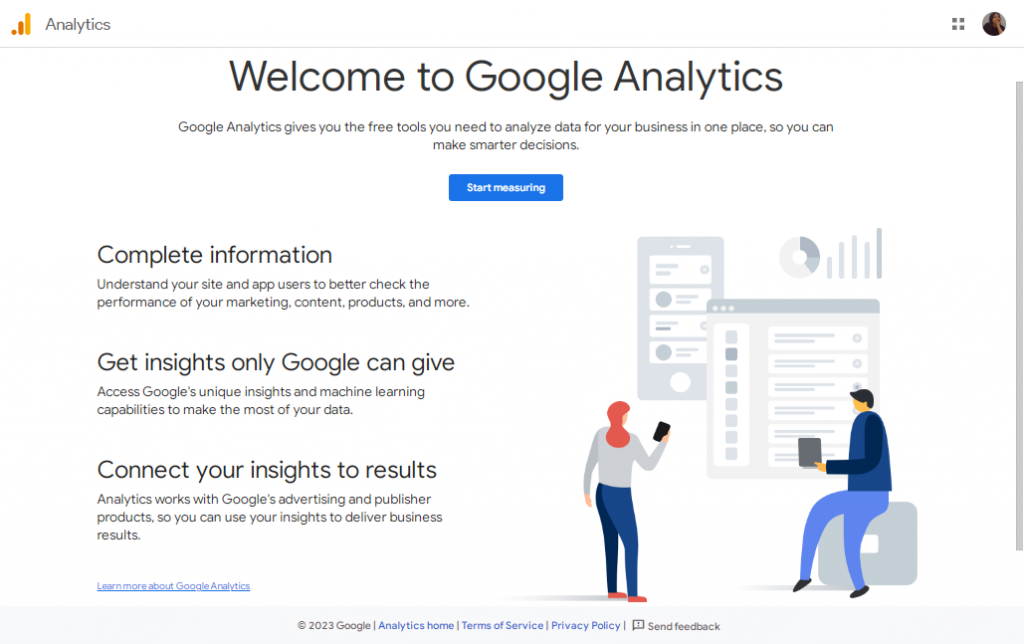
Google Analytics tool is a famous data analytics tool used for eCommerce site analysis. This tool offers a wide range of insights that are free of cost. Hence, owners choose the google analytics tool for their eCommerce website for providing an amazing starting point for the analysis of their platform.
This tool has one feature known as Google Analytics Enhanced eCommerce that offers eCommerce site owners advanced analytical features. This feature helps the marketing team to easily understand traffic and increase sales accordingly.
Here are some requirements when you can easily use the Google analytics tool on your website:
- When you want to know about your website traffic and from where it is coming and how to convert them into regular users.
- Understand drop-offs happening, for instance, shopping cart abandonment.
- Find pages with the highest bounce rate and which pages have kept longer engagement for visitors.
The main advantage of this one of the best digital marketing tools is that most of its features are free of cost. Hence, if you own a startup eCommerce website, you can use free features to give a boost to your website.
3. Optimizely

Optimizely is an experimentation & optimization analytical tool that allows businesses to optimize and test different prospects of their website or mobile app. With Optimizely, businesses can test various aspects of their website’s design, content, and functions to determine which components drive the most engagement and conversions.
Optimizely has a wide range of features designed to help businesses create and execute effective optimization experiments. These features include personalization, A/B testing, advanced analytics, and much more.
Personalization offers help to businesses in tailoring the user experience to individual visitors and creating a more engaging and relevant experience. A/B testing allows owners to test different variations of their eCommerce site or app in a decided environment, allowing them to create data-driven decisions about which elements to use or discard.
Advanced analytics offers eCommerce owners detailed metrics on experiment performance. This feature allows them to refine their strategies for improved results.
Overall, Optimizely is an effective optimization tool that guides businesses of all sizes to improve their website’s performance. With its intuitive interface and robust features, Optimizely is an essential tool for any online store looking to stay ahead and drive engagement and conversions.
4. Crazy Egg
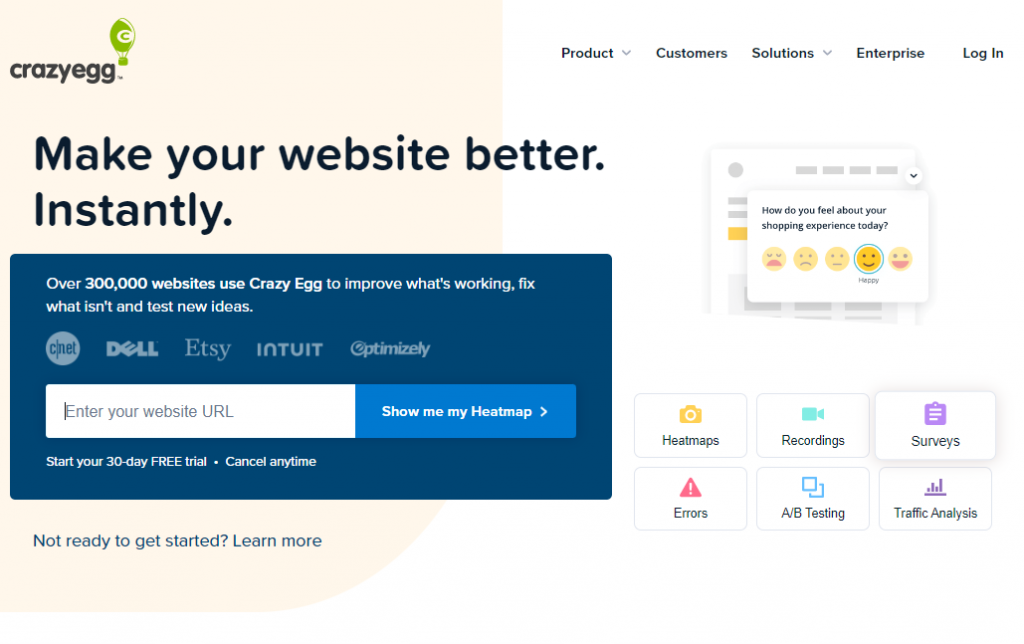
Crazy Egg began as one of the famous heat maps tools but it also quickly grew well as a Shopify application. This tool has almost all the features that an eCommerce owner needs for improving the conversion rate of the site.
- Crazy egg discovers where the user is engaging the most on your eCommerce website, and also monitors what’s overlooked.
- You can easily monitor visitor website clicks in different colors to understand the traffic sources. This feature helps you understand key customer interactions in your online store.
- You can easily determine if the CTA buttons are in the right place or not.
With the use of a scroll map tool, you can know where the correct place to place your CTA button.
The Crazy Egg tool is powerful and it helps you understand how online users interact with your online store and products. With the use of the data collected by this tool, one can improve the eCommerce conversion rate.
5. Supermetrics
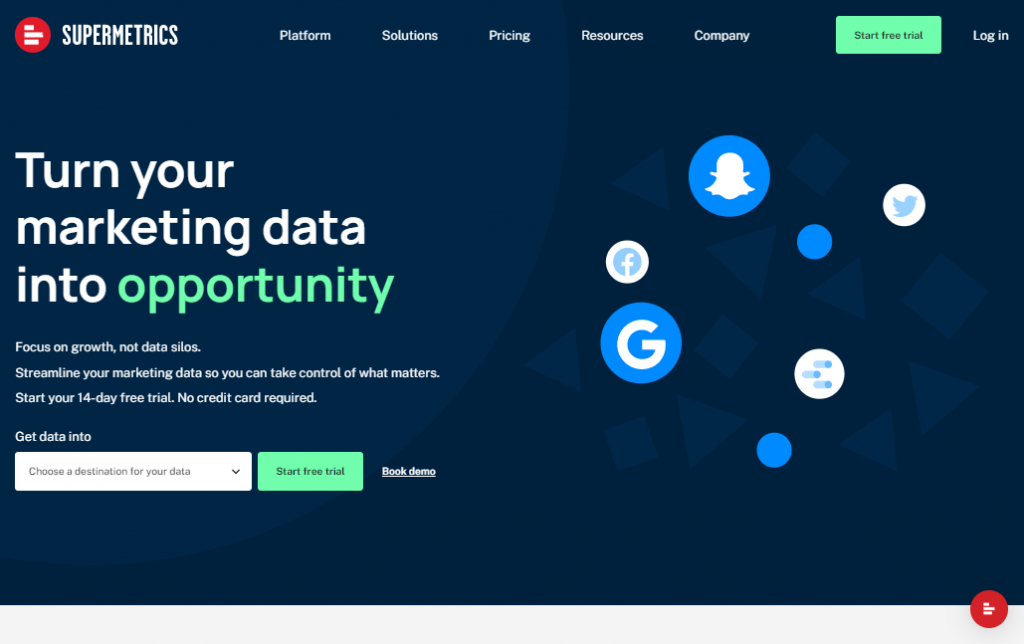
Supermetrics is an information analytics tool that benefits eCommerce websites in many ways. With the ability to integrate with different data sources, Supermetrics helps eCommerce businesses to gather and analyze data from different channels in one place. This allows owners to gain a detailed view of their eCommerce site’s performance and prepare informed decisions based on timely and accurate data.
This tool offers customizable dashboards, which help businesses to create visuals of their information such as charts and graphs to quickly identify ongoing user trends and patterns.
It can also automatically develop reports based on predefined sources; which saves time and reduces the risk of errors that might occur when manually creating reports.
Overall, Supermetrics helps eCommerce businesses to form a structured system of their data collection and gain valuable insights, analysis processes, and make data-driven conclusions to improve their website’s performance.
By using Supermetrics, eCommerce owners can track and analyze information across multiple platforms, gain a complete view of their customer’s behavior across various channels, and ultimately, optimize their website’s performance to increase conversions and revenue.
6. Matomo
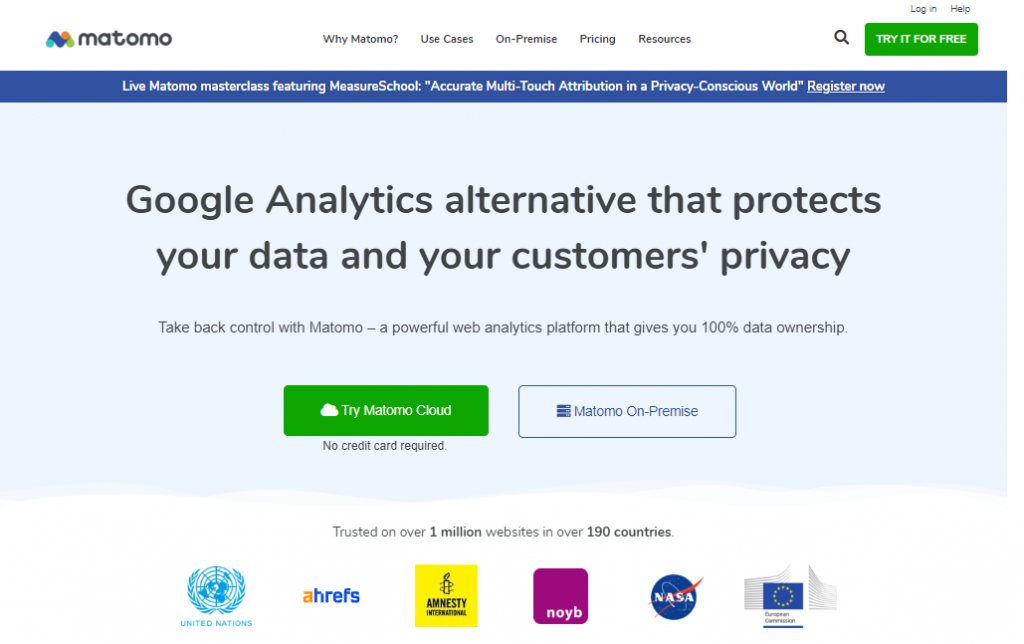
Matomo (now known as Piwik) is an open-source web analytics platform that offers website owners to gather, analyze, and have a visual representation of their website data. It offers a set of tools to measure marketing campaigns, monitor user behavior, and look after website performance. Matomo is made to be privacy-friendly, which means it respects the security of the website users by storing data anonymously.
Matomo consists of a range of features like heatmaps, real-time visitor tracking, conversion tracking, session recordings, and e-commerce analytics. It provides customizable dashboards and also reports that help users analyze their information in real time.
Matomo can be installed on-premises by giving users full control of their data. Or sometimes this tool can be utilized as a cloud-based service.
Overall, the Matomo tool is a powerful web analytics platform that helps website owners with insightful perceptions of their site’s performance and user behavior. The features of privacy-friendliness and open-source nature make it popular for businesses and entrepreneurs who value data privacy and security.
7. Woopra
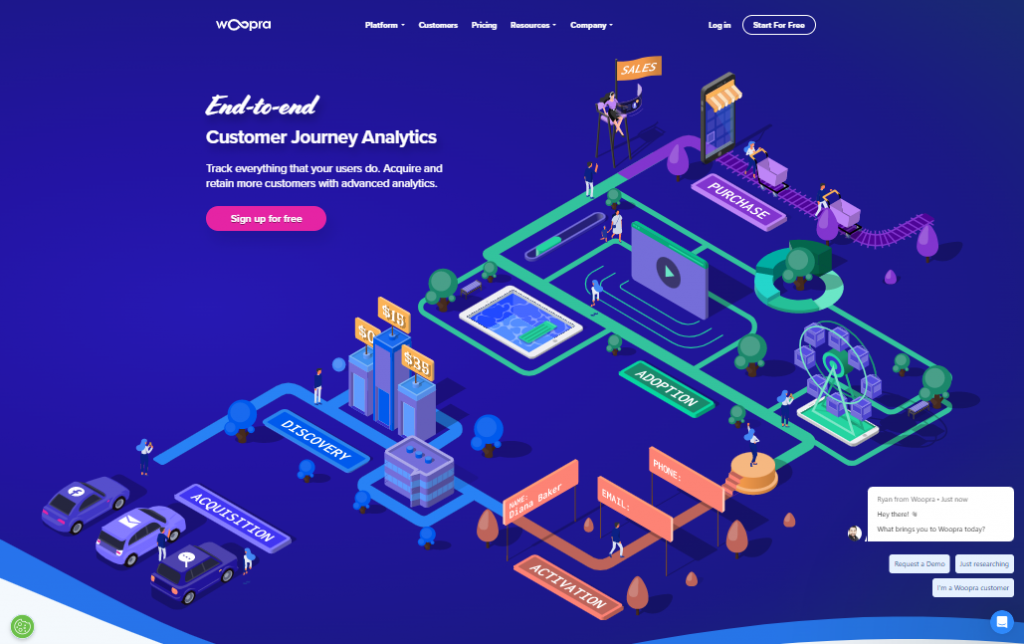
Woopra is a customer journey tracking and web analytics tool that helps owners to know their user’s behavior and enhance their customer experience.
It provides real-time data on website user behavior and engagement, allowing businesses to create data-driven decisions to improve their online store’s performance, UX, and marketing campaigns.
This tool has a range of features like customer website analytics, journey tracking, email and marketing analytics, and user segmentation. It provides a useful set of integrations along with marketing tools and platforms like Salesforce, Google Analytics, and WordPress (WP), among others.
Woopra’s tracking features extend beyond the website including mobile apps and allow businesses to monitor user behavior across various devices and channels.
The real-time analytics and user-friendly interface make it a well-known choice for online stores of all sizes, from startups to large enterprises. Its concentration on customer journey tracking and analysis helps businesses to gain a better understanding of their customer’s behavior and preferences. This enables them to improve their UX and bring positive growth.
8. Hotjar
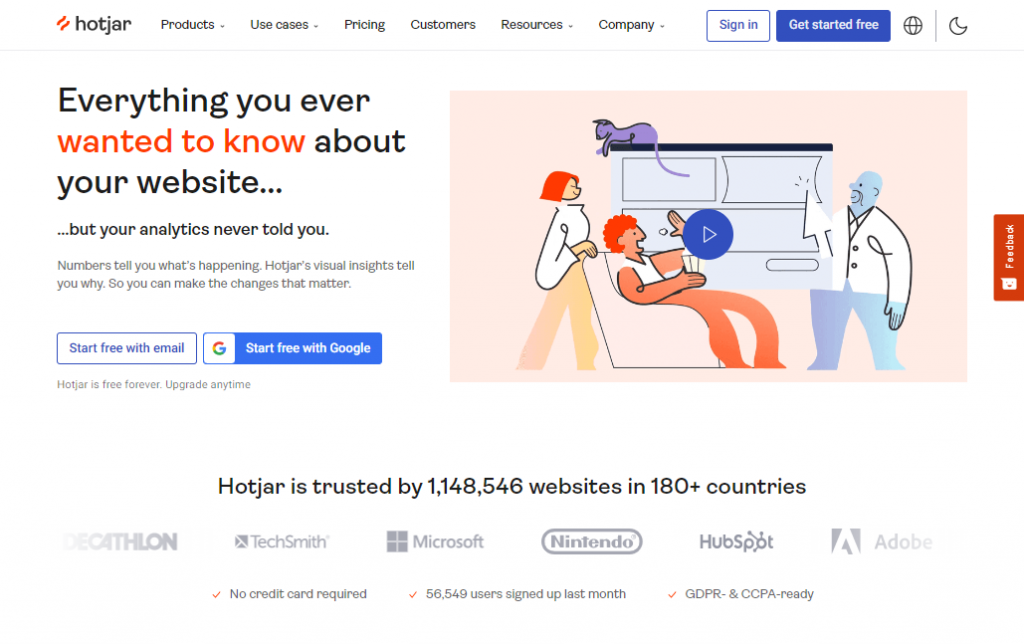
Hotjar is a tool for web analytics and user feedback that allows businesses to enhance their website performance and user experience. It has a range of features like heatmaps, website analytics, feedback polls, and session recordings that help businesses to know how clients interact with the website and search for areas of improvement.
The heatmaps and session recordings provide visual representations of user behavior, allowing owners to see how users interact with the website, which pages they see, and how they handle different elements on the page. The feedback polls allow organizations to have feedback from their users, helping them to know their customer’s preferences.
Hotjar also provides integrations with different marketing tools and platforms like Shopify, Google Analytics, etc. This allows entrepreneurs to easily use Hotjar’s data with their already-running marketing and analytics tools. Which creates a full view of the performance and user behavior.
Overall, this is a powerful web analytics tool that provides businesses with valuable insights into their website performance and UX. Its focus on visual representations of user behavior and direct feedback from users allows businesses to quickly identify areas for improvement and optimize their websites for better engagement and conversion rates.
9. Savvycube
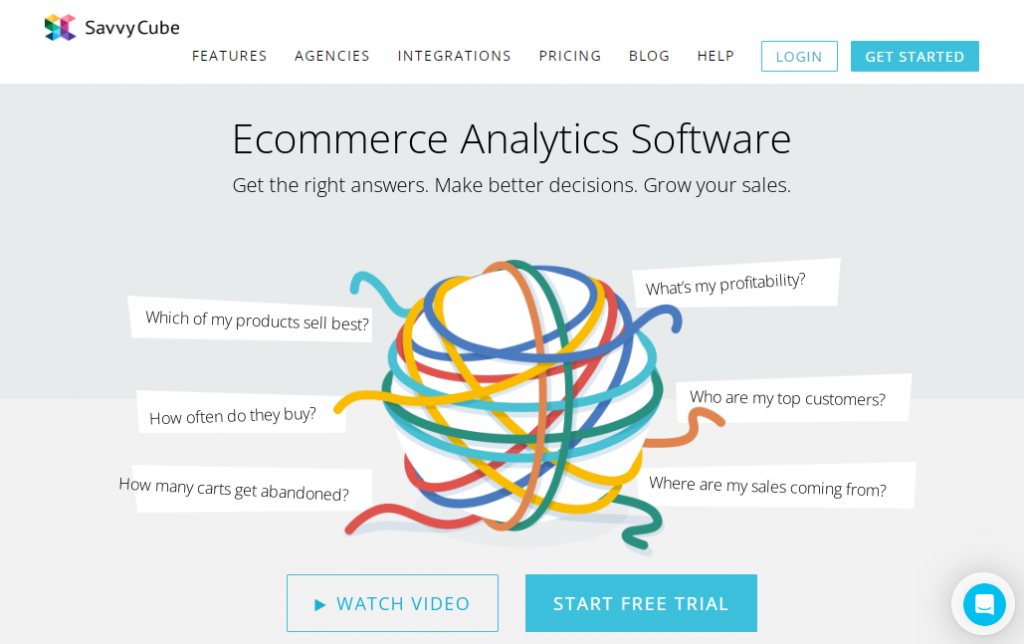
SavvyCube is a data analytics tool made to help organizations make data-driven decisions by giving insights into their e-commerce operations. It is specifically designed for e-commerce sites that use the Shopify platform, and it integrates directly with their Shopify store to gather data and provide real-time analytics.
SavvyCube can provide businesses with a wide range of data and insights, including:
- Marketing analytics: SavvyCube can help businesses track the effectiveness of their marketing campaigns by providing information on traffic sources, conversion rates, and more.
- Customer analytics: SavvyCube can provide information on customer behavior, such as their buying habits, order history, and lifetime value.
- Sales analytics: SavvyCube can help businesses track their sales performance by providing information on revenue, profit margins, order volume, and more.
- Product analytics: SavvyCube can provide insights into product performance, including which products are selling well and which are not, as well as information on inventory levels and stockouts.
SavvyCube has all of these insights through an easy-to-use dashboard, which can be customized to display the data that is most relevant to each business. This makes it easy for businesses to quickly access the data they need to make informed decisions about their e-commerce operations.
10. Mixpanel
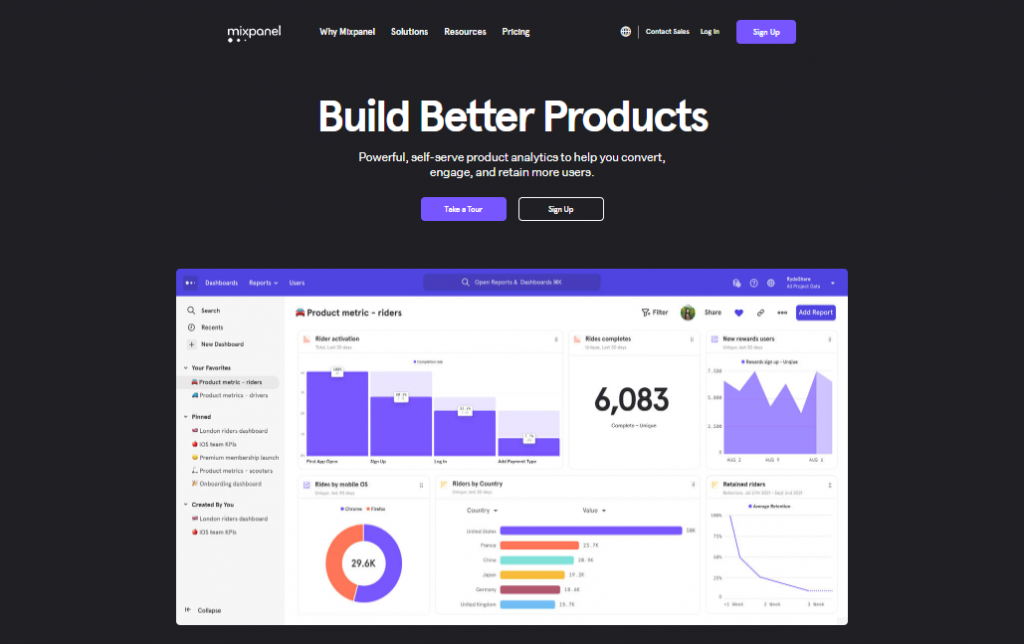
Mixpanel is a data analytics tool that is commonly used by eCommerce websites to track and analyze user behavior on their site. Here are some key features and benefits of Mixpanel for eCommerce:
- Funnels: Mixpanel enables you to create funnels to track user behavior through a series of steps, such as adding a product to their cart, starting the checkout process, and completing a purchase. This allows you to identify where users are dropping off and optimize the user journey to improve conversions.
- Event tracking: Mixpanel allows you to track specific user events, such as clicks, page views, and purchases, in real-time. This enables you to understand how users are interacting with your site and identify any bottlenecks or areas for improvement.
- Segmentation: Mixpanel allows you to segment users based on various criteria, such as location, device type, and behavior. This enables you to identify patterns and trends in user behavior and create targeted campaigns and experiences to improve engagement and retention.
- A/B testing: Mixpanel allows you to run A/B tests to experiment with different variations of your site and track their impact on user behavior. This enables you to make data-driven decisions about site design and optimization.
- Retention analysis: Mixpanel enables you to track user retention over time, allowing you to identify which users are most likely to stick around and which are at risk of churning. This can help you optimize your retention efforts and improve customer lifetime value.
Overall, Mixpanel is a powerful tool for eCommerce websites looking to understand and optimize user behavior on their site. By tracking key events and user behavior, analyzing funnels and segmentation, and running A/B tests, you can make data-driven decisions to improve engagement, retention, and conversion rates.
How can VOCSO help with your eCommerce development?
VOCSO is an eCommerce development company based in India that has been providing high-quality services to global clients since 2009. With over a decade of experience, VOCSO has established itself as a leading web development company, offering a wide range of services to businesses of all sizes and industries.
VOCSO’s team of experts includes PHP developers, AngularJS developers, ReactJS developers, Laravel developers, NodeJs developers, designers, and digital marketers who work together to create innovative and effective eCommerce solutions. They use cutting-edge technologies and tools to build custom eCommerce platforms that meet the unique needs and requirements of each client. Whether it’s building a new online store or redesigning an existing one, VOCSO’s team can help businesses achieve their eCommerce goals.
One of the key strengths of VOCSO is its ability to provide end-to-end eCommerce solutions. From designing and developing the eCommerce platform to integrating payment gateways, shipping and logistics solutions, and customer relationship management tools, VOCSO can handle all aspects of eCommerce development. They also provide maintenance and support services to ensure that the platform operates smoothly and efficiently.
VOCSO has worked with clients from various industries, including retail, healthcare, education, and hospitality. Their extensive experience and expertise have helped them deliver successful eCommerce solutions to clients from around the world.
Partnering with VOCSO can provide businesses with a competitive edge in the online marketplace. Their customized eCommerce solutions and affordable eCommerce packages can help businesses increase sales and revenue, improve customer engagement and loyalty, and gain valuable insights into consumer behavior and preferences.
If you’re looking for a reliable and experienced eCommerce development company, look no further than VOCSO. Contact them today to discuss your eCommerce needs and find out how they can help you achieve your online business goals.
Concluding Words
In conclusion, there are numerous eCommerce analytics tools available in the market, each offering unique features and benefits. Some of the most popular eCommerce analytics tools include Google Analytics, Adobe Analytics, Shopify Analytics, Mixpanel, and Kissmetrics.
These tools provide valuable insights into user behavior, enabling businesses to optimize their eCommerce strategies and improve customer engagement, retention, and conversion rates. With the right eCommerce analytics tool in place, businesses can make data-driven decisions to improve their online presence, drive growth and achieve their business objectives.
Ultimately, the choice of the eCommerce analytics tool depends on the business needs, budget, and goals, so it’s essential to evaluate each tool carefully before selecting the one that’s right for your business.






